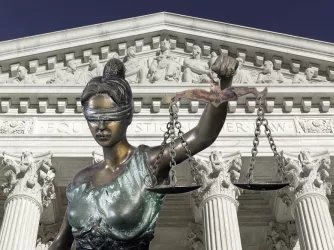Table of Contents
University of Denver Refuses to Reconsider Violation of 50-Year Veteran Professor's Academic Freedom
Over the objections of FIRE, a faculty committee, and the University of Denver Chapter of the American Association of University Professors (DU AAUP), the University of Denver (DU) has refused to reconsider its violation of Professor Arthur N. Gilbert's academic freedom. DU had suspended Gilbert earlier this year after receiving anonymous complaints of sexual harassment about his class, but all of the comments in question were based on academic material relevant to the class. Although DU claims in a letter to FIRE that it "carefully" investigated the claims, DU never evaluated Gilbert's comments in the context of the classroom environment.
Professor Gilbert is a tenured professor in DU's Josef Korbel School of International Studies. In his 50 years of teaching, he has taught such notable American figures as former Secretary of State Condoleezza Rice and former U.S. Army Chief of Staff George Casey. In the spring 2011 quarter, Gilbert taught a graduate-level course on "The Domestic and International Consequences of the Drug War." According to the syllabus, one of the themes in the course is "Drugs and Sin in American Life: From Masturbation and [P]rostitution to [A]lcohol and [D]rugs," one of the points therein involving the negative effects of "purity crusades."
On April 1, 2011, two students anonymously raised subjective concerns about Professor Gilbert's teaching, and in a letter dated April 6, Dean Christopher Hill of the Korbel School notified Gilbert that Gilbert had been placed on paid administrative leave pending an investigation. DU's Office of Diversity and Equal Opportunity (ODEO) and Department of Human Resources investigated the allegations.
The investigators found all of the conduct-based allegations without basis for a sexual harassment finding. In its letter of determination on June 8, however, ODEO stated that five of the speech-related allegations, taken together and "absent an academic justification," would constitute hostile environment sexual harassment in Gilbert's class (emphasis added). Significantly, ODEO deferred academic judgment regarding "the academic integrity of [Gilbert's] teaching of the subject matter," leaving the matter to be "determined by the appropriate academic decision makers."
In a letter dated July 14, Hill wrote Gilbert, declaring that Gilbert had committed hostile environment sexual harassment. He required that Gilbert cease "this behavior" immediately and that Gilbert attend "sensitivity training."
Gilbert appealed, and a Faculty Review Committee (FRC) of Gilbert's academic peers investigated his grievance. In a report dated October 4, the committee announced its finding that DU had violated Gilbert's academic freedom:
There is no evidence in the record that members of the faculty were consulted by Dean Hill, HR [Human Resources], or ODEO in determining Professor Gilbert's teaching methods constituted sexual harassment. Nor was there any reference to external standards that might have led to such a conclusion. ... To summarily remove a member of the faculty from the classroom and ban that person from campus and from contacting colleagues and students because of something that was said in the classroom and reported anonymously, without full consideration, ... violates academic freedom and overall concepts of fairness.
Despite this clear finding, DU Provost Gregg Kvistad denied Gilbert's appeal on October 20. Although the FRC had explicitly concluded that DU had violated Gilbert's academic freedom by failing to engage in an academic review of Gilbert's classroom expression, Kvistad stated that the FRC itself had declined to do so. In other words, by Kvistad's own admission, the relevance and appropriateness of Gilbert's academic expression in the classroom has never been evaluated.
Indeed, Kvistad completely ignored the fact that ODEO's hostile environment finding relied on an evaluation of the entire classroom environment, taking all of the allegations together as a whole. Kvistad also stated that he had examined the classroom as a "workplace" environment, ignoring the critical differences between the classroom and the "workplace," as understood by harassment law. In sum, Kvistad upheld Hill's finding of sexual harassment but modified the punishment to include a single conversation with ODEO Director Kathryne Grove rather than sensitivity training.
FIRE wrote DU Chancellor Robert Coombe on November 4, asking that the provost's erroneous decision be vacated or, at least, that Coombe direct the appropriate reconsideration of the allegations in light of their academic context and the entire classroom environment. The DU AAUP echoed this request in a letter on November 12. (The DU AAUP had first registered concern in a letter back on May 20.)
DU replied to FIRE on November 14, arguing that the university had "carefully investigated the complaints" while ignoring the documentary record showing the lack of due care. DU added that the decision is "final" and the matter is "resolved," but I don't think this case is going to leave the public eye anytime soon. It is not too late for DU to reopen Professor Gilbert's case and restore academic freedom to the faculty of the University of Denver.
Recent Articles
FIRE’s award-winning Newsdesk covers the free speech news you need to stay informed.

LAWSUIT: Videographers sue to overturn National Parks Service arbitrary permit scheme

Supreme Court must halt unprecedented TikTok ban to allow review, FIRE argues in new brief to high court

Australia blocks social media for teens while UK mulls blasphemy ban
